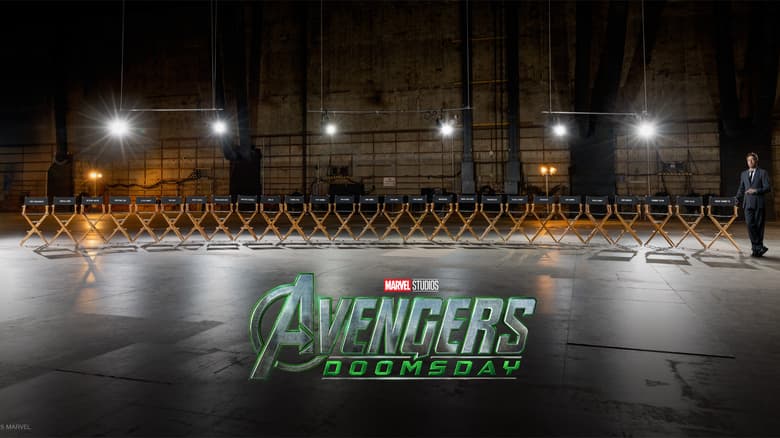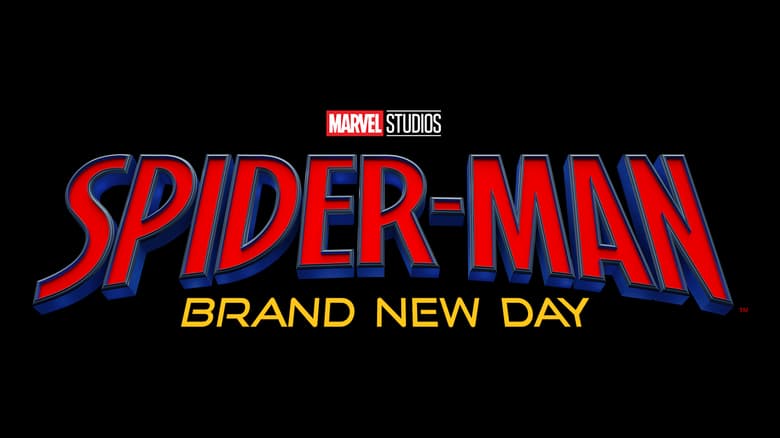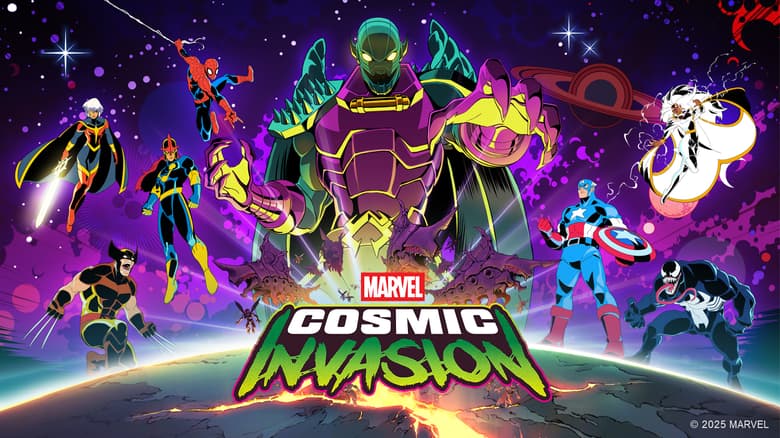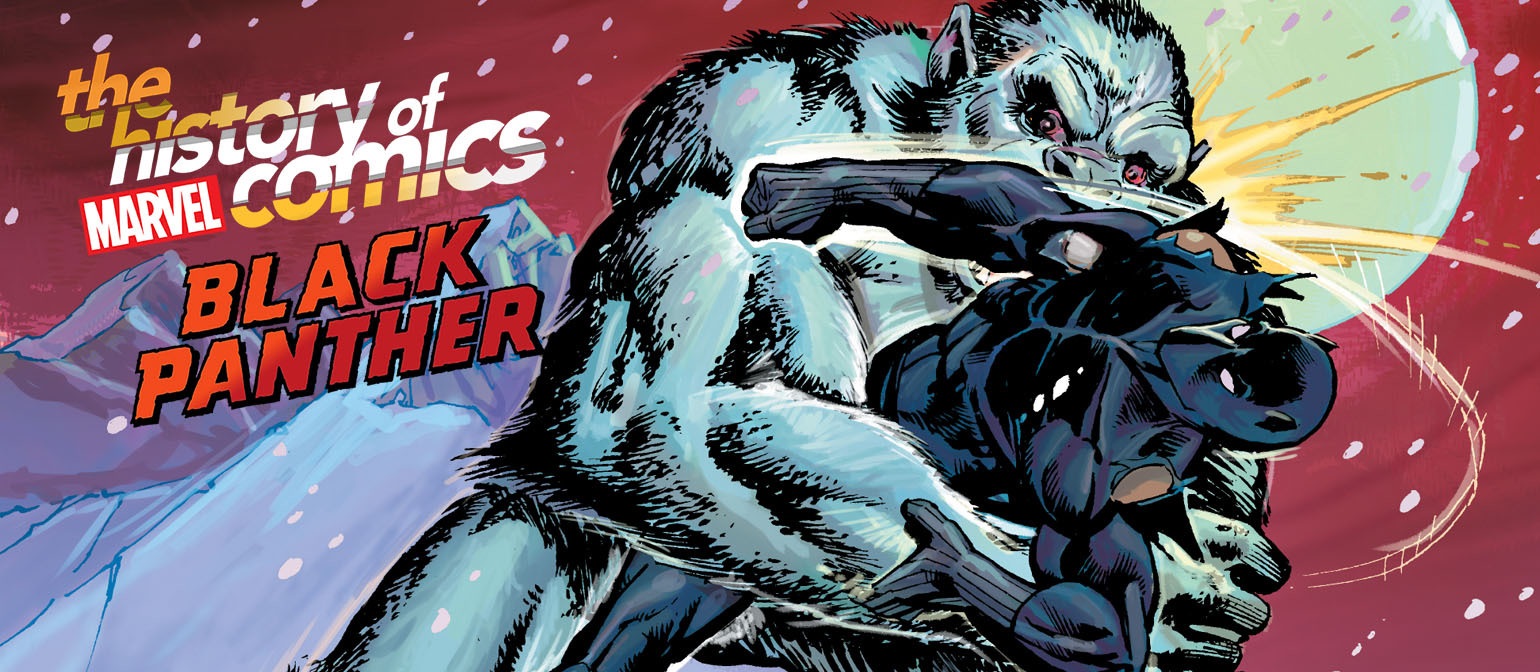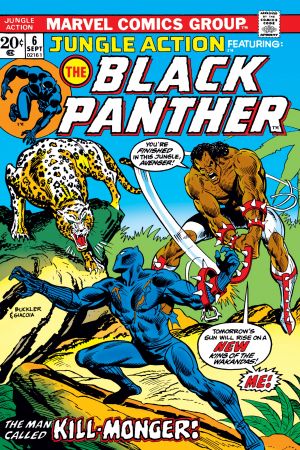The Boundary-Breaking Legacy of T’Challa Is Explored in ‘The History of Marvel Comics: Black Panther’ Podcast
Tune into the second episode now to hear about Black Panther’s pivotal ‘70s and ‘80s from creators Don McGregor, Alex Simmons, Peter B. Gillis, and host Nic Stone.
In the second episode of podcast series The History of Marvel Comics: Black Panther, explore T’Challa’s history-making turn in the “Panther’s Rage” arc, the storyline that introduced Killmonger to Marvel readers for the very first time.
This six episode documentary podcast is hosted by New York Times best-selling author Nic Stone, who explores the comic book origins of the Black Panther through conversations with the creators who shaped T’Challa’s journey, celebrating the innately Afro-Futuristic world of Wakanda, while analyzing the larger social impact of the character. Both new and lifelong fans will get a behind-the-scenes look in a definitive tell-all of how T’Challa came to be Black Panther, and how he and Wakanda have evolved since.
Listen to the second episode now featuring legendary Black Panther creators Don McGregor and Peter B. Gillis, plus McGregor and artist Billy Graham’s personal friend and co-author of Black Panther Psychology, Hidden Kingdoms Alex Simmons.
Grab our top highlights below, and read the companion comics discussed in the first episode on Marvel Unlimited!
ON THE LEGENDARY “PANTHER’S RAGE” STORYLINE:
NIC STONE: This is Don McGregor. And if Stan [Lee] and Jack [Kirby] are the Black Panther's fathers, well, Don McGregor is like that really dope uncle that might take you to see an R-rated film or maybe introduce you to Wu-Tang or Metallica. But back in 1973, Don McGregor still had a ways to go before he'd even begin to think about writing Black Panther. He started as a copy editor which, at that time, was a fairly entry level position at Marvel.
DON MCGREGOR: There was an unwritten rule that if you worked on staff at Marvel and if you were a writer, you would eventually get some work. I was proofreading books there at the time and mostly the reprint books that were going out.
NIC STONE: One of those books was JUNGLE ACTION (1972), an anthology series brought back from the 1950s back when Marvel was known as Atlas Comics.
DON MCGREGOR: Some of the books were just so racist. I mean I would read this stuff and it would just make me cringe.
NIC STONE: Up until this point, JUNGLE ACTION featured a collection of old reprinted stories that starred a slew of white jungle-themed heroes, like Lorna the Jungle Queen and Lo-Zar, Lord of the Jungle. Long story short—lots of white dudes saving white women from African bad guys. Anyway, Don did the responsible thing and brought it up to the editorial staff at the time.
DON MCGREGOR: So when they were giving out assignments, they gave me the Black Panther and JUNGLE ACTION.
NIC STONE: By this point in history, T'Challa has been around for about seven years. And even then, he's only ever really been a guest in books like AVENGERS and FANTASTIC FOUR.
DON MCGREGOR: So you had this great concept from Stan and Jack. But because there were only so few issues done with the character, there weren't a lot of stories set in Wakanda. And you could read everything in those days. And so for the longest time, as I was working out what the storyline would be, it was designing Wakanda. What else is in this place? What is it like? Designing maps for it. I wanted to make sure I had different kinds of locales for people to go into, the things I can give to the artists so that they will know what the dress is, what the place actually looks like, so we're coming as close as we can to being accurate.
NIC STONE: And if Wakanda was supposed to be this advanced, highly technological, culturally rich and complex country that was hidden from the world, it meant that Wakanda had to be self-sufficient. And if it was self-sufficient—
DON MCGREGOR: Well, that meant everybody was Wakandan. That meant everybody was Black. Marvel Comics had not done a book where the entire cast was Black.
NIC STONE: This was huge. Sure, there had been Black characters within the pages of Marvel Comics. But to make the entire cast Black? Let's just say Marvel editorial wasn't real comfortable with this.
DON MCGREGOR: There was a continual saying: “Well, where's the white people?” Where's the white people? Hey, it's your mythology, not mine. You guys created it!
ON THE CREATION OF KILLMONGER:
NIC STONE: Don McGregor's solution to [bring T’Challa back to Wakanda] was to create one of the, if not the greatest, villains of all time, N'Jadaka, otherwise known as Erik Killmonger. See, while T'Challa is off in America playing Avenger, it leaves the Wakandan throne vulnerable, which gives Erik the perfect opportunity to mount his insurrection...
DON MCGREGOR: Killmonger was not accepted by Marvel Comics and by editorial the way he is these days. They weren't used to a Black character that was that angry, that was that strong. And I wanted a character that, as soon as you saw him, you say, how the hell is T'Challa going to beat this guy?
NIC STONE: Mind you, T'Challa was, and always has been written as the antithesis of the "Angry Black Man" stereotype. So the introduction of Killmonger as his adversary was pretty bold.
DON MCGREGOR: And I was really lucky to have [artist] Rich Buckler. Because if Editorial wasn't crazy about the books, they were crazy about Rich Buckler.
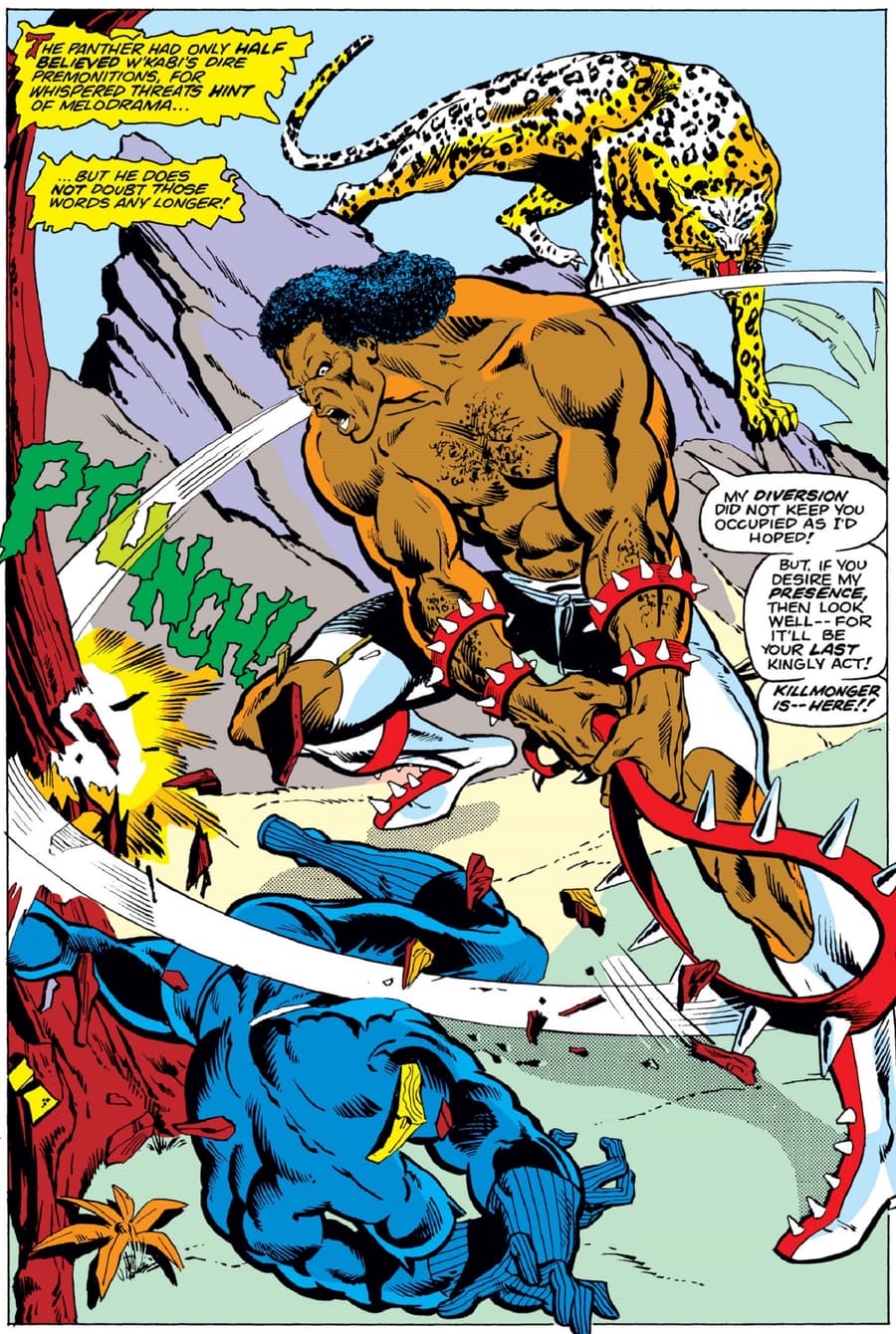
DON MCGREGOR: [Editorial] did not want Rich Buckler on the Black Panther. He just wasn't an important enough character at that time. They wanted Rich doing the Fantastic Four or the Avengers, the grade-A books.
NIC STONE: And by the third issue of “Panther's Rage,” Marvel Editorial had decided enough was enough. They pulled Rich Buckler off the Panther comics and replaced him with another artist, the late Billy Graham.
ON THE CHARACTER-DEFINING WORK OF BILLY GRAHAM:
NIC STONE: Billy [Graham] passed away in 1997. But he wasn't just a Black artist. He was the very first Black artist at Marvel, and the first Black artist to work on the Black Panther.
DON MCGREGOR: And the first page that he drew of “Panther's Rage” was the splash page where T'Challa's being attacked by a giant crocodile, the one titled "King Cadaver is dead and living in Wakanda."
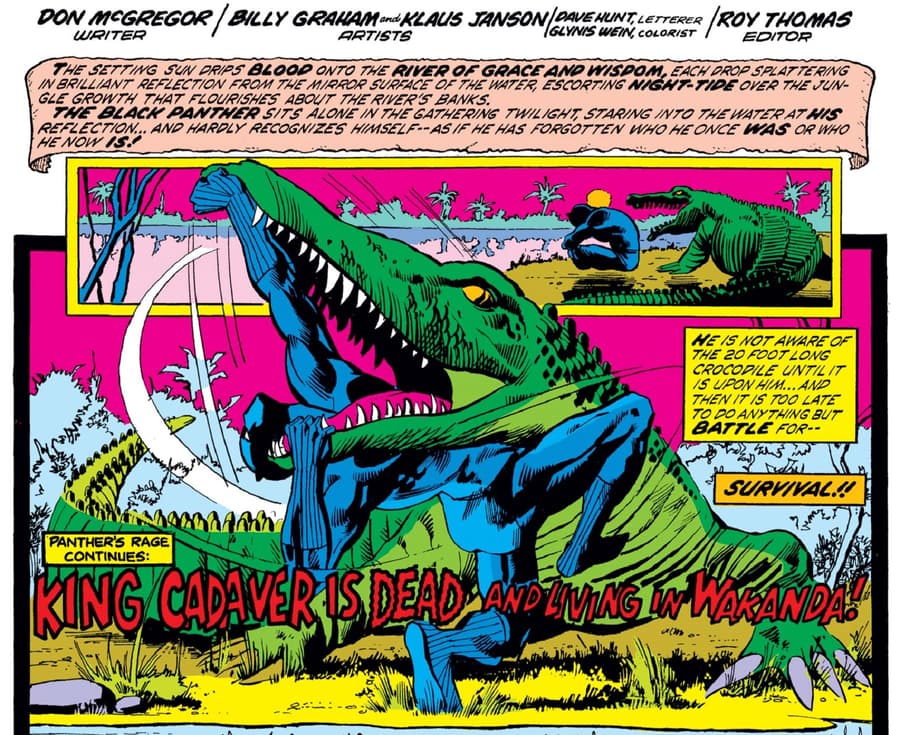
NIC STONE: Billy Graham was a phenomenal artist. We truly don't deserve the art he put within the pages of Black Panther. But he was much more than that. He was a true Renaissance man. He loved acting, he wrote several stage plays, and he even won awards for his set designs.
ALEX SIMMONS: Billy was amazing.
NIC STONE: This is Alex Simmons. He's an award-winning comic book creator and the co-author of Black Panther Psychology, Hidden Kingdoms. He's lucky enough to have been a close friend to both Don McGregor and Billy Graham during the creation of “Panther's Rage” in the early 1970s.
ALEX SIMMONS: Billy had been doing work in the industry, and was at that time also one of the only Black artists getting some kind of work, major work. He'd worked for [Warren Publishing] as an art director and an illustrator. And [Don and I] had met Billy at a Comic-Con. That's a story all unto itself.
DON MCGREGOR: I spent a lot of time with Billy in Harlem, and I would stay with Billy on 143rd and Lenox Avenue.
ALEX SIMMONS: And I lived in the West 90s, so just below Harlem, and Don lived out in Queens. But we would sometimes congregate in Harlem.
DON MCGREGOR: A lot of adventures. Great times.
NIC STONE: By 1973, Billy Graham had left Warren Publishing and was now a full-time artist at Marvel. Together, Don and Billy hit the ground running, starting with JUNGLE ACTION #10.
ALEX SIMMONS: When Billy came [onto the book], I would say there was a difference. A visual difference. There was more of a variety to the rendering of the faces of the Black characters. His art style was very lush, and full, and thick. But also, there were subtle differences in the rendering of faces and certain hairstyles and things that I think came from Billy's exposure as a Black man, and the world that he lived in.
ON BLACK PANTHER’S RETURN TO THE SOLO SPOTLIGHT:
NIC STONE: With the exception of a small three-issue arc in MARVEL PREMIERE, there wouldn't really be another Black Panther solo series printed for almost 10 years. By then, a fresh new crop of creatives had entered the House of Ideas. And among those people were fans of the Black Panther of yesteryear.
PETER B. GILLIS: I knew Don's work, and I'm going, this is them at the top of their form. This is great. “Panther’s Rage” was detailed, it had that Don McGregor thoroughness, and it was just wonderful. Don was creating new ground as he was working on it. This sort of tied into how I ended up doing the [1988] limited series. Because I was perpetually looking for work up at Marvel, you know? Pestering every editor I could talk to. And one of them was my friend, Bob Budiansky. And I said, “Do you have any work”? And he looked at me and said: “Well, you know, Denys Cowan really, really, really wants to do the Black Panther.”
NIC STONE: He's talking about legendary artist and co-founder of Milestone Media, Denys Cowan.
PETER B. GILLIS: And I really, really, really wanted to work with Denys Cowan. And [Budiansky] said, but he doesn't really have a story. So can you sit down with him and see about putting together a story?
NIC STONE: And so he does. He meets up with Denys in a Marvel conference room. Denys shows the sketches he's developed for the book, Peter shares a couple of Ideas with him, and the two really begin to hit it off.
PETER B. GILLIS: I said, let's do the Panther versus apartheid in South Africa. And Denys's eyes kind of went wide, and he went, can we do that? And I said, worse they can say is "no."
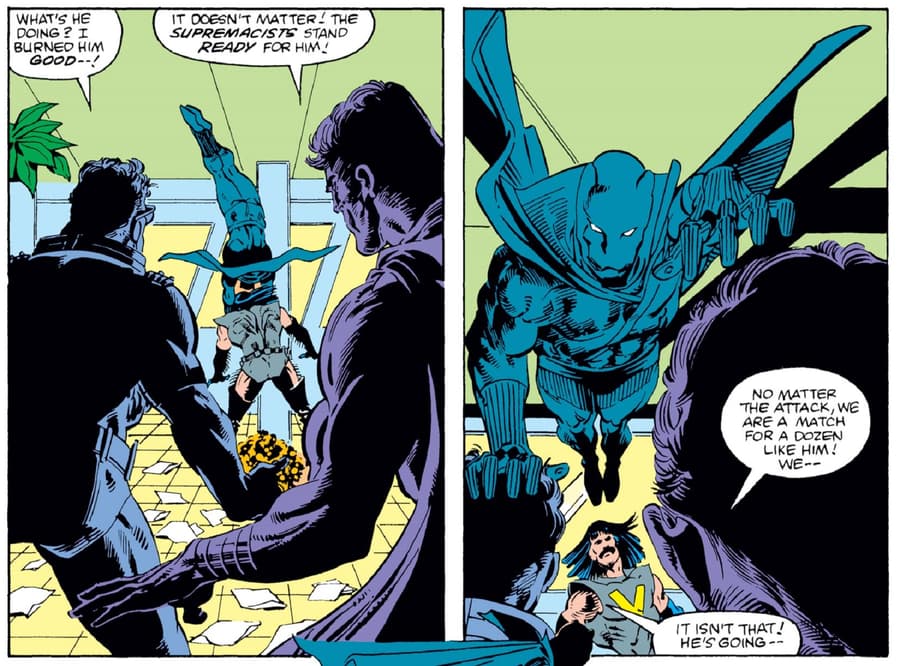
The History of Marvel Comics: Black Panther brings writers, artists, and historians together to share a story that only Marvel can tell. The show features exclusive interviews with notable talent including Brian Stelfreeze, Christopher Priest, Joe Quesada, John Ridley, John Romita Jr., Reginald Hudlin, Ta-Nehisi Coates, and more.
The series will initially be available exclusively on the SXM App and Marvel Podcasts Unlimited on Apple Podcasts. Episodes will be widely available one week later on Pandora, Stitcher, and all major podcast platforms in the U.S. Learn more at siriusxm.com/blackpanther.
The Hype Box
Can’t-miss news and updates from across the Marvel Universe!
